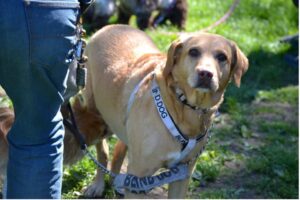Rusty lost his vision due to Sudden Acquired Retinal Degeneration Syndrome (SARDS). This is his owner’s uplifting story:
“If you’re reading this, it’s probably because you’ve been told that your dog is going blind, or has gone blind. You’ll be in a state of confusion, distress and overwhelming worry. You’ll be wondering if your dog is going to be ok, or perhaps even that you think their life is going to be so bad it might be kinder to have them put to sleep. Before you make any decisions, and before you get even more upset, let me tell you my story, with my dog Rusty…
“Rusty was always very active, running after a ball, and poking his nose in everywhere. We walked for about 5 miles a day, but with his running back and forth he would probably do double that! Christmas 2018 his vision was fine, we spent a portion of Christmas day with me throwing him a ball into the sea and he would swim out and retrieve it. However, by January 4th I knew there was a problem, because he would run after his ball in the park and couldn’t find it, even though it was right at his feet. After various vets visits and consultations it became clear he had no vision at all.
“Needless to say, it was a huge shock – this was not one of life’s plot twists that I was prepared for. Rusty did get very depressed, and it was difficult to get him to do anything for a couple of weeks. But then I realised something – Rusty is a dog who just happens to be blind. He’s NOT a blind dog. It’s vital that you continue to treat your dog as a dog first, and a blind dog second. If you start treating him or her with kid gloves, your dog will sense this, and react accordingly.
“I then expected Rusty to walk out of the front door, work out where the car is, go to the boot, wait for me to open it, and then jump up and into it. Sometimes he missed the boot and scrabbled around. So we would start again, and second time around, he got it. When we got to the woods he was off his lead as soon as possible, sniffing out interesting scents, walking along the paths, going around corners with little or no guidance. When we went somewhere new, such as a friend’s garden he would map it out. He’d start at the fence (or whatever) and work his way around the outside first, then start to move inwards. Sometimes he walked into things, and then stopped, worked his way around them and carried on. Over the course of perhaps an hour he would have the entire area mapped out with a high degree of accuracy. He used his senses of smell and hearing to great effect – if you didn’t know that he was blind you probably wouldn’t realise it.
“It’s was the same at home. He knew where all the furniture was, where his bowls were, where the stairs were, the dimensions of the garden and so on. I did make a few concessions for him – after he fell in the fishpond twice I put a small fence around it. I put heavily textured mats at the top and bottom of the stairs so he knew when he had reached them, and I got piping insulation foam and put those on the edges of some doors and tables. I also make sure that I don’t move the furniture around, and tidied up anything that he might trip over such as shoes etc.
“Someone said something to me very early on which I found very helpful ‘he doesn’t know that the rest of the world hasn’t gone dark as well’. Dogs do not think the way humans do. They live far more in the minute, and they are more accepting of a change in circumstance. He was not frightened, partly because we were not frightened for him. His other senses really kicked in, I’d certainly suggest doing some research on how dogs smell, because it will really give you a lot of reassurance that a lack of sight doesn’t mean a lack of quality in your dog’s life.
“I’m not going to say that everything is perfect – of course it isn’t. Rusty sometimes lost his mental map, and would walk straight into a wall, and might then panic and walk into another one. I simply held him, talked to him until he has calmed down, then I led him back to a place he knew well and I could almost see him reboot his mental map and go off again. You may find your dog’s habits change for a while – you might need to reteach them about going outside to do their business. You may need to teach some new commands; ‘this side’, ‘careful’, ‘wait’, ‘stop’, ‘round the corner’ and ‘straight ahead’ are ones that I found useful. He picked the new ones up really quickly.
“I’d suggest getting some toys that have a sound element to them – balls with bells in for example. I also wear a set of bells on my keyring. You can get some very good harnesses, collars and sheaths for your dog’s lead which say ‘blind dog’. Expect strange reactions from people – they’re often very inquisitive, and they will often assume you’re training your dog to be a guide dog, and that it’s you who is the blind one. Some people also get very surprised that dogs can go blind!
“In summary, your future life with your dog who happens to be blind is going to be fine. They will manage perfectly well, they will continue to enjoy their life as much as they have ever done, and they will adjust to the new normal far, far quicker than you will. Trust your dog, show confidence in your dog, believe that your dog can manage perfectly well and they will pick up on that from you, and believe it or not, they will. Blindness is one of the least important aspects of your dog’’.

